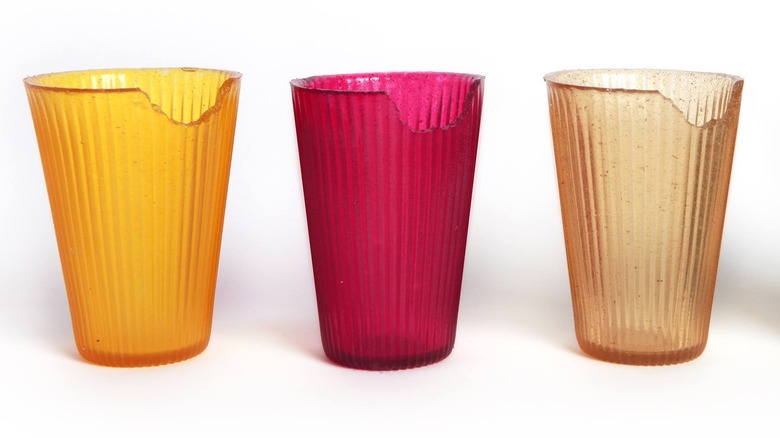Where Is Loliware From Shark Tank Today?
While the red Solo cup is a party staple, the disposable item isn't the most environmentally friendly choice. If a brand offered an edible cup, could that optimal be the solution to ditching plastic? Loliware brought the concept of edible drinkware to "Shark Tank" and swam away with a deal. And while the edible drinkware pitched on "Shark Tank" might not be in people's hands, Loliware is still in business today.
Appearing on "Shark Tank" Season 7, Loliware offered the Sharks 10% equity in exchange for an investment of $150,000. The brand's founders, Chelsea Briganti and Leigh Ann Tucker, impressed the Sharks with their business knowledge and experience. The concept of a "biodegr(edible)" product that was easy to use, palatable to consumers, and financially viable worked in their favor. In addition, the concept addressed a concern that continues to be a hot topic in the business world: sustainability.
After multiple Sharks wanted to get in on the deal, Mark Cuban and Barbara Corcoran raised a glass to the partnership, a $600,000 investment for 25% of their company. While it seemed that the partnership would proceed swimmingly, the reality is that Loliware's cups have disappeared from the bar shelf. But the brand name lives on in a different version.
How did Loliware edible cups become a viable drinking solution?
When Loliware received interest from multiple Sharks on "Shark Tank" Season 7, it seemed that the brand was ready to take off. During a conversation with the Shark Tank Podcast, founders Chelsea Briganti and Leigh Ann Tucker revealed a bounty of behind-the-scenes details about the show's process. Given their business background, they had a targeted plan for specific Sharks. Although there was a possibility to get everyone on board, they referenced that the show frowned on deals with more than two Sharks. The legal terms can get complicated with too many parties.
Listening to the founders on the podcast post-show airing, the outlook seemed positive. The company had placements at large hotel chains, theme parks, and other high-profile businesses. In addition, the reviews were positive. Yahoo! Food saw the benefit for parties, especially for the approachable flavor, which was similar to a Fruit Roll-Up. Overall, the concept seemed to fill a niche. While there are other edible serving items (think ice cream cones), it makes sense to bring an edible cup to the beverage space.
But Loliware stopped making its edible cups and pivoted towards a different sustainable serveware solution. It's unclear if the business concept was unviable due to scale, interest, or something else. While there might not be an edible gelatin cup on the shelf, the concept might reappear again.
Loliware focuses on products 'designed to disappear'
Pivoting away from the cup, the brand now focuses on sustainable serveware. Using seaweed, the proprietary resin provides an alternative to single-use plastics.
When Loliware launched its blue carbon straw, made from seaweed, the brand gained attention. It wasn't just an innovative solution; it also had a viable business plan. In May, the brand announced a partnership with José Andrés Group to provide straws to its restaurants across the U.S. This particular partnership could see the brand's name recognition soar.
It is unclear whether the current version of Loliware is still under the "Shark Tank" deal. Chelsea Briganti, who was part of the original "Shark Tank" appearance, spoke to CNBC in May 2022 about the company's sea-inspired technology and seems to be involved with the current business model. While the company might not be selling edible cups, the organization continues to move towards a less plastic-driven society. The serveware isn't edible, but it also won't add to the trash pile floating in the ocean.


